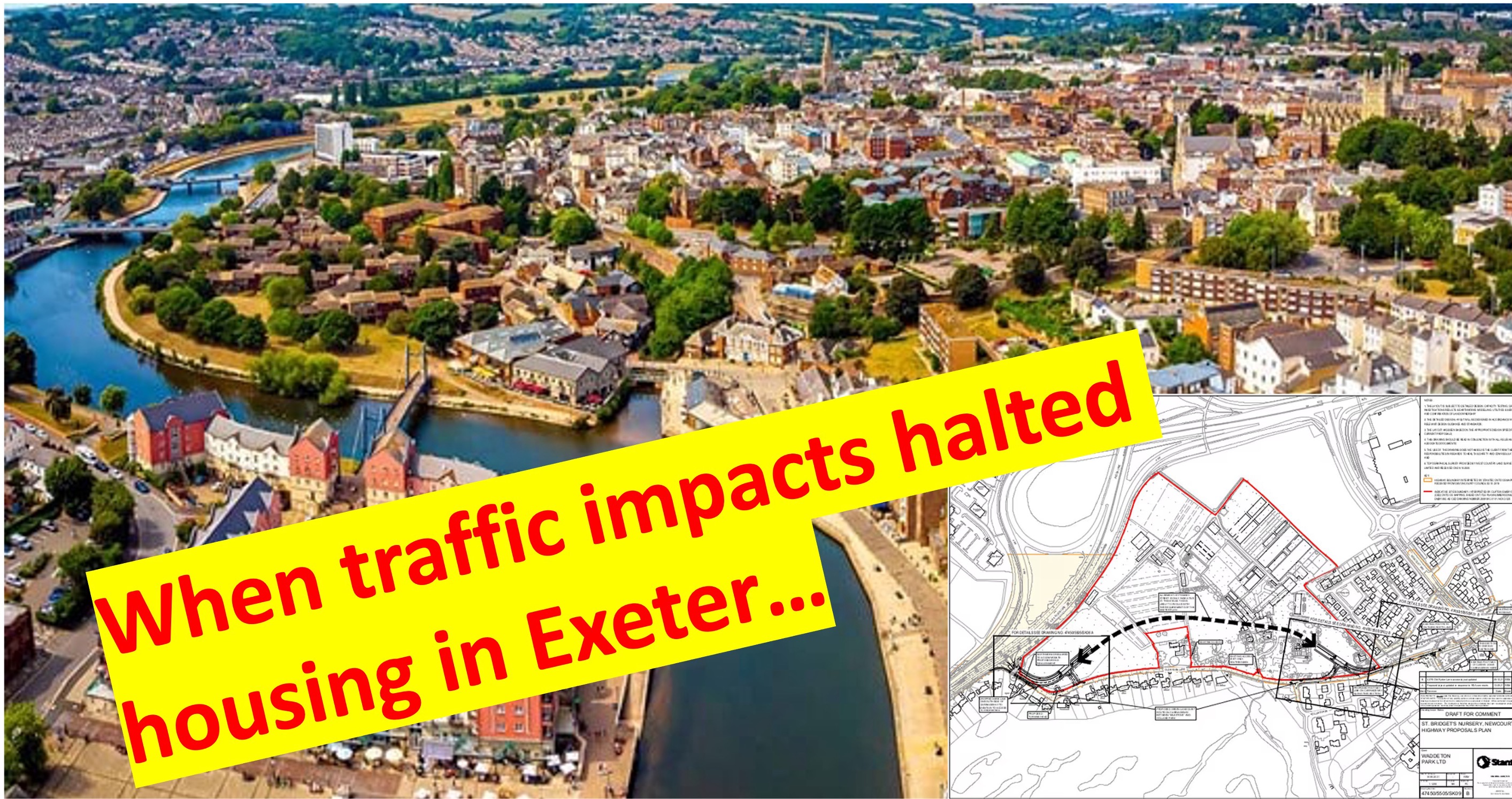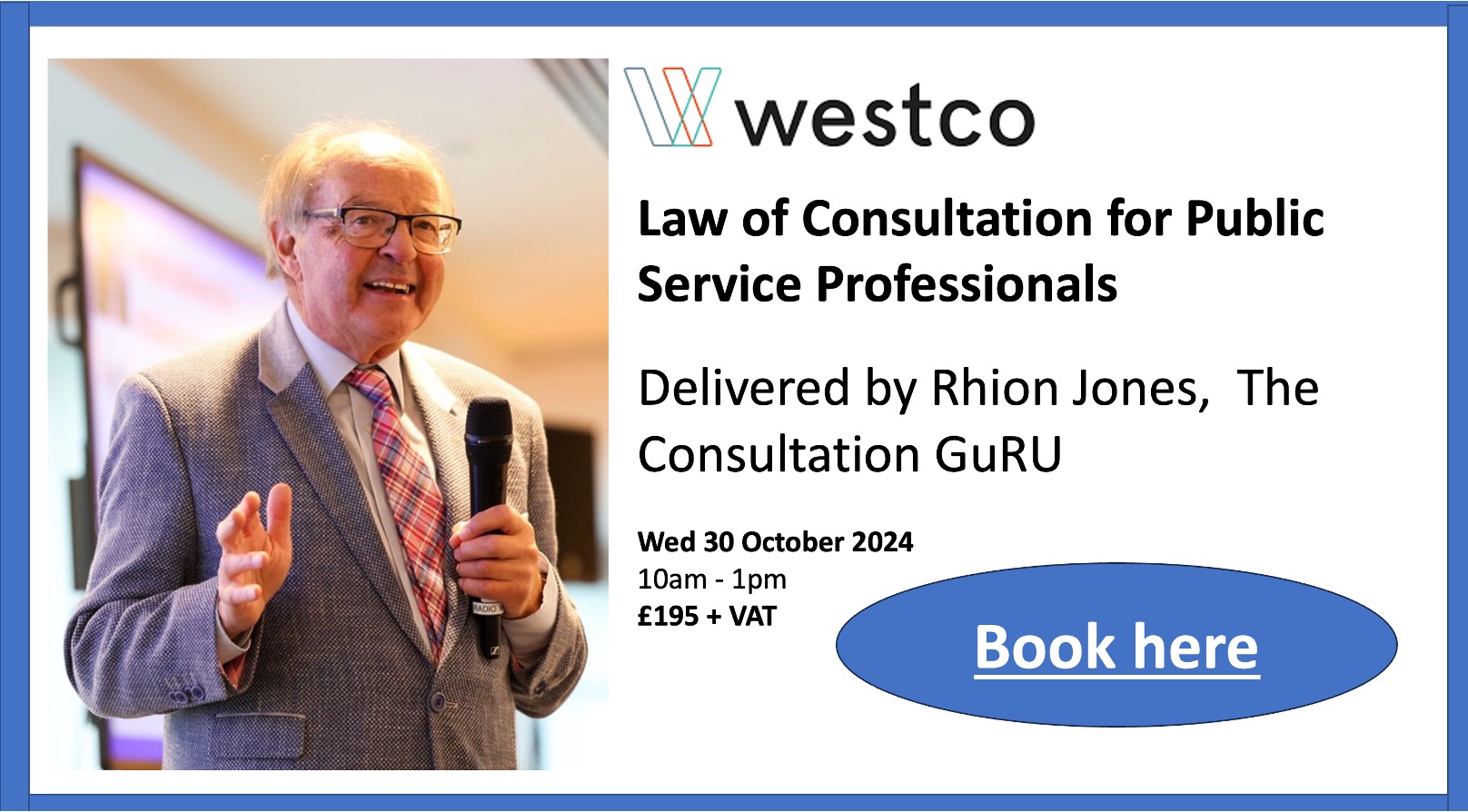This is Blog 81
A classic row over housing development in Exeter is illustrating the challenge we face in building more houses. It also raises interesting questions when responders to a consultation disagree – and it ends up in Court.

The facts are fairly straightforward. Property developers, Waddington Park Ltd want to build up to 350 houses at St. Bridget Nursery, Exeter. The City Council, as the Planning authority granted planning permission, and one of the residents mounted a legal challenge arguing that Devon County Council – as the Highway authority had, as a ‘statutory consultee’ provided misleading advice.
The case is Pratt v Exeter County Council and Mrs Justice Lang decided in favour of the claimant in February this year. At the time, I thought it was a fairly unremarkable case, but, in the light of the heightened priority now given to housing, I have re-read the judgment and believe it is of more significance for all those of us concerned with public engagement and consultation.
This is because it covers two increasingly important issues – the challenge of balancing adverse impacts and public trust in expert third parties.
Impacts
Mrs Pratt objected to the housing development because the proposals would affect her – and her neighbours’ quality of life. The access scheme included a road closure, the introduction of a one-way system necessitating longer travel times for local journeys as well as significant increases in vehicles, pedestrians and cyclists passing her driveway. She asserted that the Highway authority had totally disregarded these impacts; the Judge agreed she and won her case.
Such impacts are quite typical and affect most if not all housing developments. The whole point of a planning system is to act as a mechanism for assessing and determining which consequences are acceptable in the wider public interest, and which are not. A political consensus appears to have emerged that our housing shortage has been aggravated – if not entirely caused – by the balance having tilted too much towards preserving existing residents’ current positions and preferences rather than lean towards new development and building more houses.
Consultations are one way to inform those decisions; they are a long-standing method of establishing what residents perceive as being the implications of proposals, and often reflect the extent to which developers have invested in reassuring local people that the benefits of various schemes outweigh the disadvantages. The danger with the currently anticipated ‘planning reform’ is that they will assume the answer to be YES regardless of the likely impacts on existing communities. Especially if a local plan has been agreed … and designates a particular site as suitable for development.
In Pratt v Exeter, there had been a Masterplan for the area, with access proposals much more acceptable to local people. The developer chose another solution, presumably to save money, and the claimant was forced therefore to rely upon the technical assessment of the Highways authority – Devon CC, and the advice it gave the Planning Authority.
What then happened was that this ‘statutory consultee’ failed to follow the logic of its own masterplan and stated that the impacts upon Mrs Pratt and her neighbours were acceptable. Exeter then took this advice at face-value. Ultimately, the Judge found that, in the light of the objections raised by local people, Exeter was under a duty to make further inquiries (something called the Tameside duty following an important 1977 judgment) and when it failed to do so, this rendered the planning decision unlawful.
In short, to be lawful the impacts have to be properly considered.
Public trust in expert third parties
And so, to the wider point. The term ‘statutory consultee’ is rooted in planning law and reflects the need to avoid decisions being taken in ignorance of important considerations where specialist input is required. To take a simple example, you don’t decide upon a new housing site without seeking the advice of the relevant Water Company – as to whether it will have enough water – or the Environment Agency – as to whether it might have too much – by way of flooding!
There are great many statutory consultees and lots of others whose advice is manifestly needed for key decisions. They slow down decision-making and whenever Governments have complained about the long timescales, successive Inquiries have pointed the finger at overworked public agencies which have lacked the resources to respond to the number and complexity of consultations they have to address. Much of these problems were self-inflicted as when the austerity regime of 2010-2015 demanded drastic cuts to arm’s length bodies such as Natural England or Highways England. Unsurprisingly, the quality and quantity of responses suffered. It is still a serious issue.
In the Pratt v Exeter case, there were serious failures in the Response given by the Highway Authority. Counsel for Exeter tried to argue that as a planning authority, it was entitled to assume that Devon had ‘complied with its obligations’, but this was rejected by the Judge. She ruled that Exeter had to be sure that the statutory response was competent.
This takes us into really difficult territory. In many consultations, public confidence relies upon a degree of trust that decision-makers have before them the required technical advice. And sometimes it is well beyond insights or information generally available to the general public. Where - as in this case – it may be obvious to lay-people that an assessment of traffic impacts has not considered everything it should have done, who are we to question whether the Health & Safety Executive has correctly advised that the use of certain chemicals would be safe, or that a waste incinerator’s operation will not increase certain health hazards? Or that a particular form of high-rise building cladding was sufficiently fire-resistant?
Consultees want to be sure that other consultee views – especially those from experts – are both based on sound methodologies – and are properly considered by decision-makers. This extends well beyond planning, and well beyond existing ‘statutory consultees’. In fact, whether an organisation is designated as such probably matters not. What is critical is recognition that for key decisions, those in authority understand the need for the right advice.
Even that is not easy. Using the language popularised by Dan Rumsfeld, we can turn to specialists (‘statutory consultees’ maybe) to help us with the ‘known unknowns’. Indeed, the whole net-zero debate is turning on scientific or technical assessments of what may occur with or without various levels of intervention. We know we need this information, so we ensure that they are plugged into our consultations.
But who can help us with the ‘unknown unknowns’?
That is a difficult one, but what routine, run-of-the-mill local issues as in Exeter show us is that to carry people with us, even the most basic decisions need to reflect the best honest judgements we can make on the available evidence. If people cannot have faith in the quality of advice being offered by those who are supposed to know, or in the willingness of decision-makers to test and question such advice, the fabric of our society is seriously weakened. Good quality consultation has never mattered more
Rhion H Jones LL.B
Commentaries are prepared primarily to help consultation practitioners take account of developments in the law and to guide them on situations where legal advice should be sought. They are no substitute for reading Court judgments or studying statutory provisions or associated Guidance.

Booking link is HERE
Rhion has monitored and written commentaries on the Law of Consultation since 2007 but does not provide legal advice. He will, however, be happy to discuss the content of this or any other commentary.
See Rhion's Speeches etc - click here
For More like this - free of charge: now click here
Leave a Comment
I hope you enjoyed this post. If you would like to, please leave a comment below.